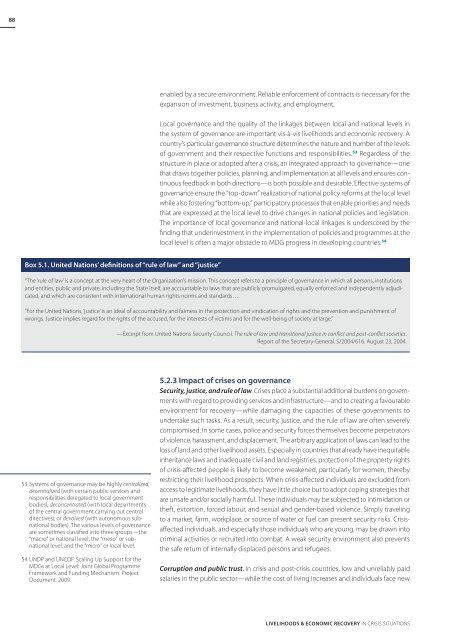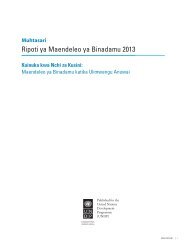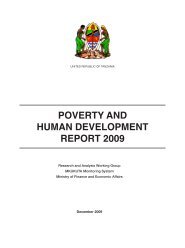Download PDF (4.08 MB) - ReliefWeb
Download PDF (4.08 MB) - ReliefWeb
Download PDF (4.08 MB) - ReliefWeb
Create successful ePaper yourself
Turn your PDF publications into a flip-book with our unique Google optimized e-Paper software.
88<br />
enabled by a secure environment. Reliable enforcement of contracts is necessary for the<br />
expansion of investment, business activity, and employment.<br />
Local governance and the quality of the linkages between local and national levels in<br />
the system of governance are important vis-à-vis livelihoods and economic recovery. A<br />
country’s particular governance structure determines the nature and number of the levels<br />
of government and their respective functions and responsibilities. 53 Regardless of the<br />
structure in place or adopted after a crisis, an integrated approach to governance—one<br />
that draws together policies, planning, and implementation at all levels and ensures continuous<br />
feedback in both directions—is both possible and desirable. Effective systems of<br />
governance ensure the “top-down” realization of national policy reforms at the local level<br />
while also fostering “bottom-up,” participatory processes that enable priorities and needs<br />
that are expressed at the local level to drive changes in national policies and legislation.<br />
The importance of local governance and national-local linkages is underscored by the<br />
finding that underinvestment in the implementation of policies and programmes at the<br />
local level is often a major obstacle to MDG progress in developing countries. 54<br />
Box 5.1. United Nations’ definitions of “rule of law” and “justice”<br />
“The ‘rule of law’ is a concept at the very heart of the Organization’s mission. This concept refers to a principle of governance in which all persons, institutions<br />
and entities, public and private, including the State itself, are accountable to laws that are publicly promulgated, equally enforced and independently adjudicated,<br />
and which are consistent with international human rights norms and standards….<br />
“For the United Nations, ‘justice’ is an ideal of accountability and fairness in the protection and vindication of rights and the prevention and punishment of<br />
wrongs. Justice implies regard for the rights of the accused, for the interests of victims and for the well-being of society at large.”<br />
—Excerpt from United Nations Security Council. The rule of law and transitional justice in conflict and post-conflict societies.<br />
Report of the Secretary-General. S/2004/616. August 23, 2004.<br />
53 Systems of governance may be highly centralized,<br />
decentralized (with certain public services and<br />
responsibilities delegated to local government<br />
bodies), deconcentrated (with local departments<br />
of the central government carrying out central<br />
directives), or devolved (with autonomous subnational<br />
bodies). The various levels of governance<br />
are sometimes classified into three groups—the<br />
“macro” or national level, the “meso” or subnational<br />
level, and the “micro” or local level.<br />
54 UNDP and UNCDF. Scaling Up Support for the<br />
MDGs at Local Level: Joint Global Programme<br />
Framework and Funding Mechanism. Project<br />
Document. 2009.<br />
5.2.3 Impact of crises on governance<br />
Security, justice, and rule of law. Crises place a substantial additional burdens on governments<br />
with regard to providing services and infrastructure—and to creating a favourable<br />
environment for recovery—while damaging the capacities of these governments to<br />
undertake such tasks. As a result, security, justice, and the rule of law are often severely<br />
compromised. In some cases, police and security forces themselves become perpetrators<br />
of violence, harassment, and displacement. The arbitrary application of laws can lead to the<br />
loss of land and other livelihood assets. Especially in countries that already have inequitable<br />
inheritance laws and inadequate civil and land registries, protection of the property rights<br />
of crisis-affected people is likely to become weakened, particularly for women, thereby<br />
restricting their livelihood prospects. When crisis-affected individuals are excluded from<br />
access to legitimate livelihoods, they have little choice but to adopt coping strategies that<br />
are unsafe and/or socially harmful. These individuals may be subjected to intimidation or<br />
theft, extortion, forced labour, and sexual and gender-based violence. Simply traveling<br />
to a market, farm, workplace, or source of water or fuel can present security risks. Crisisaffected<br />
individuals, and especially those individuals who are young, may be drawn into<br />
criminal activities or recruited into combat. A weak security environment also prevents<br />
the safe return of internally displaced persons and refugees.<br />
Corruption and public trust. In crisis and post-crisis countries, low and unreliably paid<br />
salaries in the public sector—while the cost of living increases and individuals face new<br />
Livelihoods & Economic Recovery in Crisis Situations





